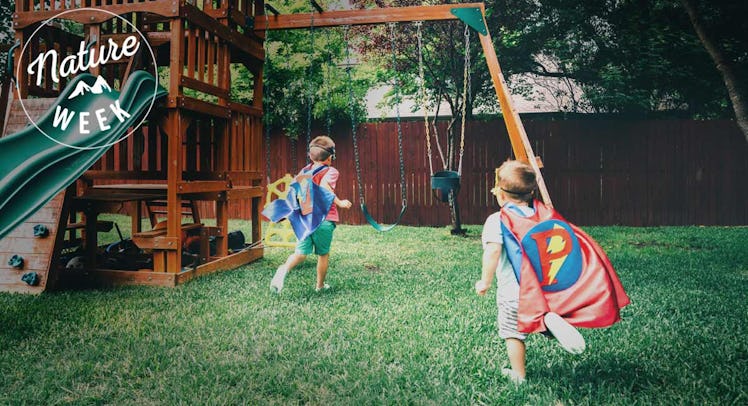I Made My Kids Play Outside and Now Their Brains Work
Experts say that the outdoors can change children for the better, but the most dramatic changes are sometimes written on their skin.

The summer had just started and my two children were already refusing to leave the house wearing shoes. My seven-year-old took light and halting steps across the rough concrete of the driveway, his elbows out and pointed to the sky as if it might make his body lighter. His 5-year-old brother followed saying, “Eek, ook, ouch, ouchy, ook,” in cadence with his steps.
“You guys, just go put on your shoes,” I sighed, waiting for them to reach the soft grass of the front lawn.
“But Poppa, we need to get our summer feet,” the seven-year-old replied.
Of course. During our long winter slumber, I’d forgotten the magic of summer feet — essentially developing a layer of calluses to protect bare feet from rocks, hot sand, and sharp, hidden twigs. I kicked off my shoes and felt the grass between my toes.
I had decided that my family would spend the first week of summer outside the house. Not just because it was seasonally appropriate, but also because I wanted to see if playing outside for a solid seven days would have any particular magic for my boys’ behavior. I assumed I’d see a change. That’s because my job requires that I talk to a lot of smart people, many of whom suggest being outside is one of the best things for kids. Not only does it help them grow physically. It helps them build their imagination and come to terms with risk.
Don’t get me wrong. I didn’t think that a week outside would turn my kids into explorers. But I did hope it would at least mellow them out a bit, maybe get them to sleep easier at night. But weirdly, my barefoot boys did seem to change right away in how they interacted with one another.
When they’re in the house, my boys tend to engage in more parallel play, engaging in separate activities side by side. But every time they stepped outside, their imaginative worlds seemed to fuse into one, two weird worlds populated with monsters and adventures melding into one. The two boys would run around the house while I sat in the sun on the front steps catching fragments of play.
“Brudder, catch the monster!”
“Use your lightning eyes!”
“Hey! Look at this white butterfly!”
“Froakie! I choose you!”
Granted, the outdoor play isn’t always peaceful. There was the occasional battle over the “best stick” for instance, resulting in a child whacking the other with said stick, but the battles were never as prolonged or as frequent as those over who is hoarding the lego wheels or picking the next TV show. There seemed to be far less crying and requests for parental mediation.
About halfway through the week, I also noticed that momentum had shifted away from the television and towards the outdoors. In the abstract, it makes sense because the outdoors is a much more dynamic and interesting place for a kid. Unlike passively watching a show, they can affect their environment in interesting ways. Outdoors is interactive.
Still, it never failed to make me happy and proud when a kid would wander past me and pull open the sliding door to play outside unbidden. Even better was the feeling of going down into the family room to find a TV impotently blaring in an empty room, abandoned by children who decided to play in the yard.
There a few reasons that they might have abandoned the TV so quickly. First of all, they were less likely to have parents breathing down their neck. So they had a sense of freedom about being outdoors that they could not have during indoor time. Plus they use their imaginations to greater effect rather than having a story told to them. They could create their own stories based on the ones they’d already seen a million times. Weirdly, TV was becoming functionally boring. Things weren’t boring outside.
Soon, the kids were starting to complain not about having to turn off the TV before bed, but coming in from outside. I recognized an echo of this behavior from my own childhood, trying to push my play into the leading edge of a purple dusk, coming in only when the light was to bad to see the game I was playing.
And the sleep that came on these nights, I found, came quickly. And I realized there’s nothing like the sleep of a kid, sprawled in their sandy sheets, who has spent hours of the day swimming in a lake with friends.
Now, I have no way of knowing if a week in the outdoors changed my children’s brains. I can’t say they were more imaginative, or more empathetic, or curious, or smarter, or better at taking risks. But I can say that their bodies changed. The thin figures of my wild boys, shirtless and shoeless, began to brown slightly. Freckles bloomed across their cheeks and shoulders. And they began to develop their summer feet, moving just a little bit more easily across the rough driveway on their way to play in the yard.